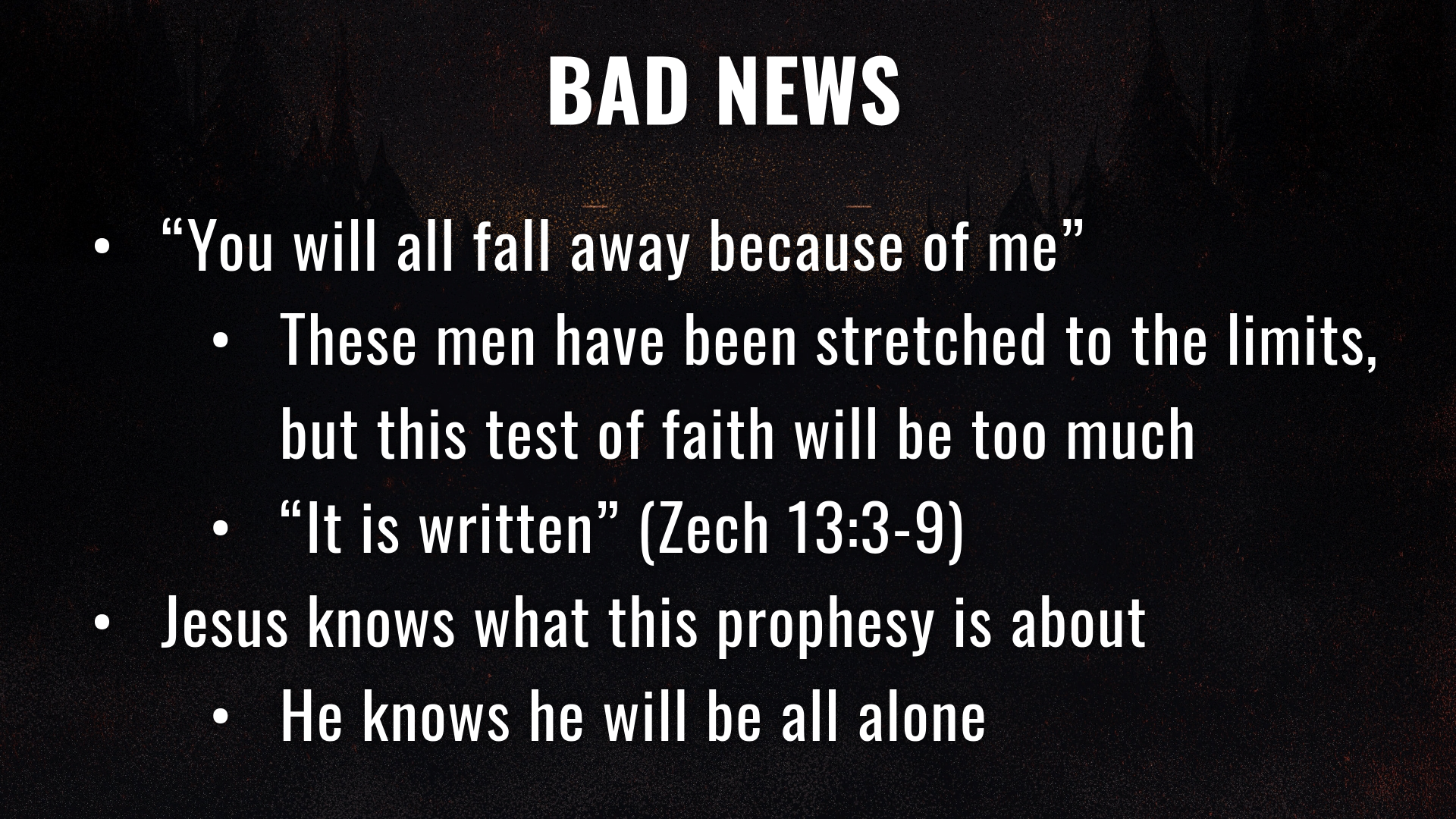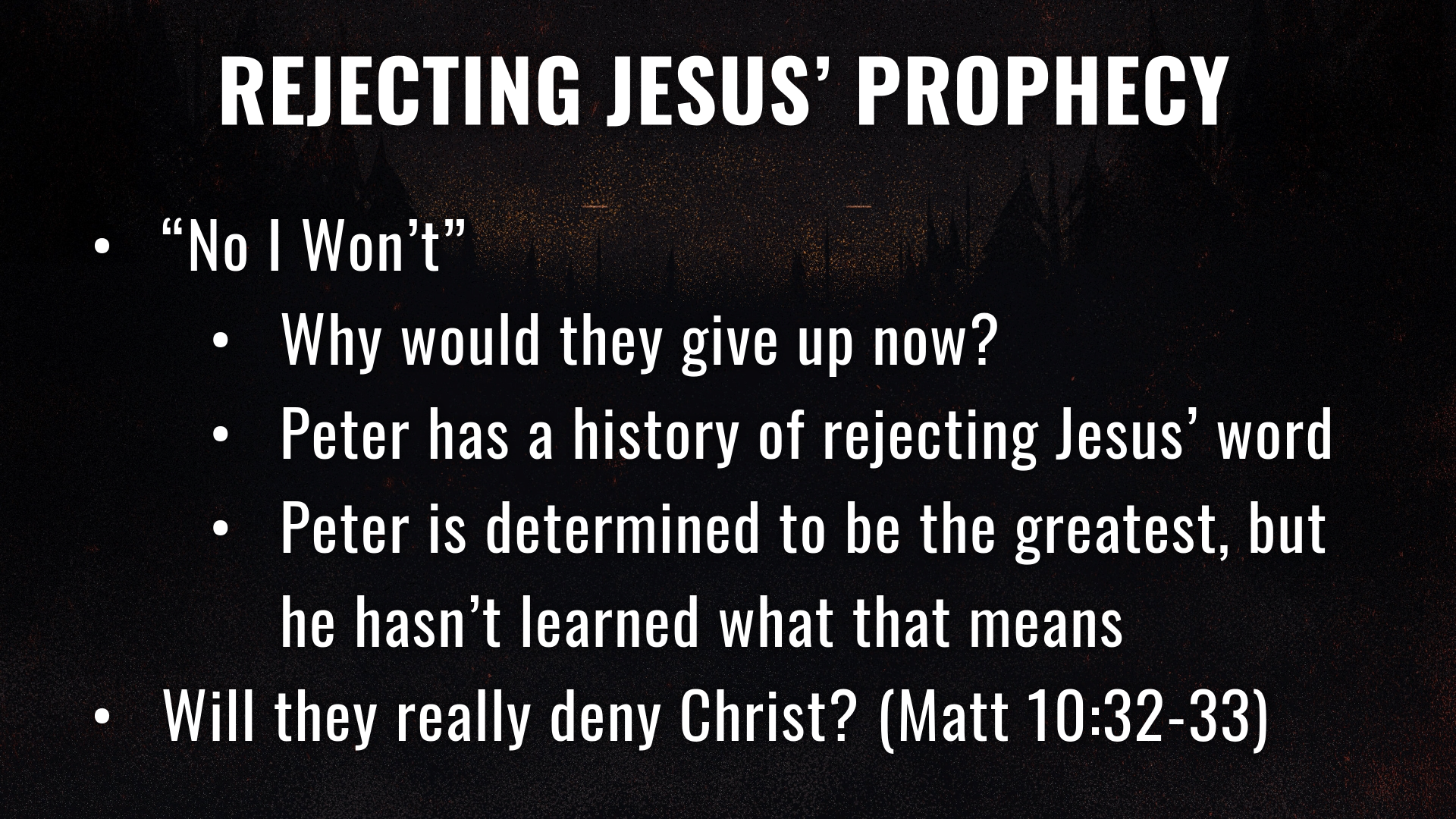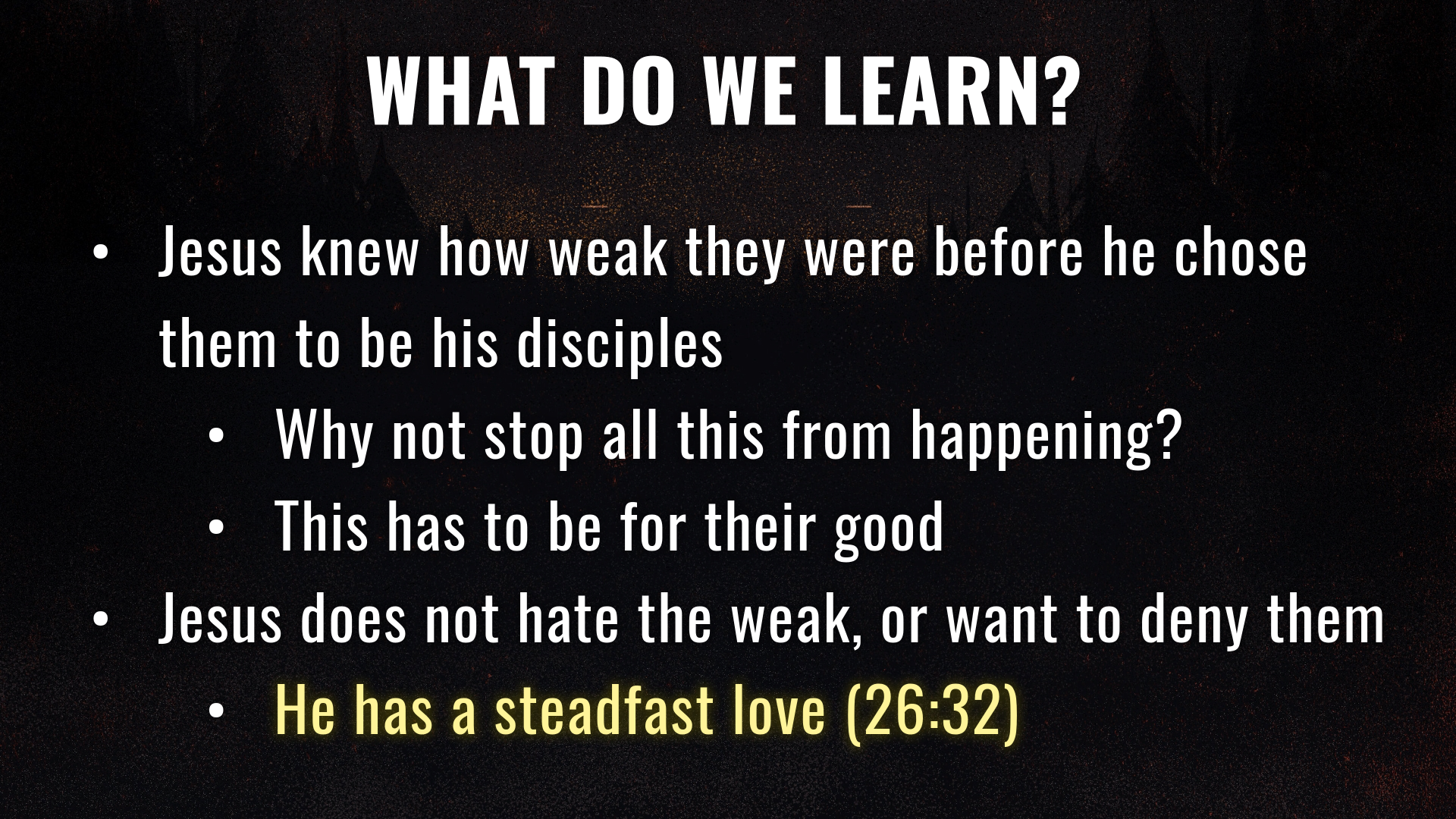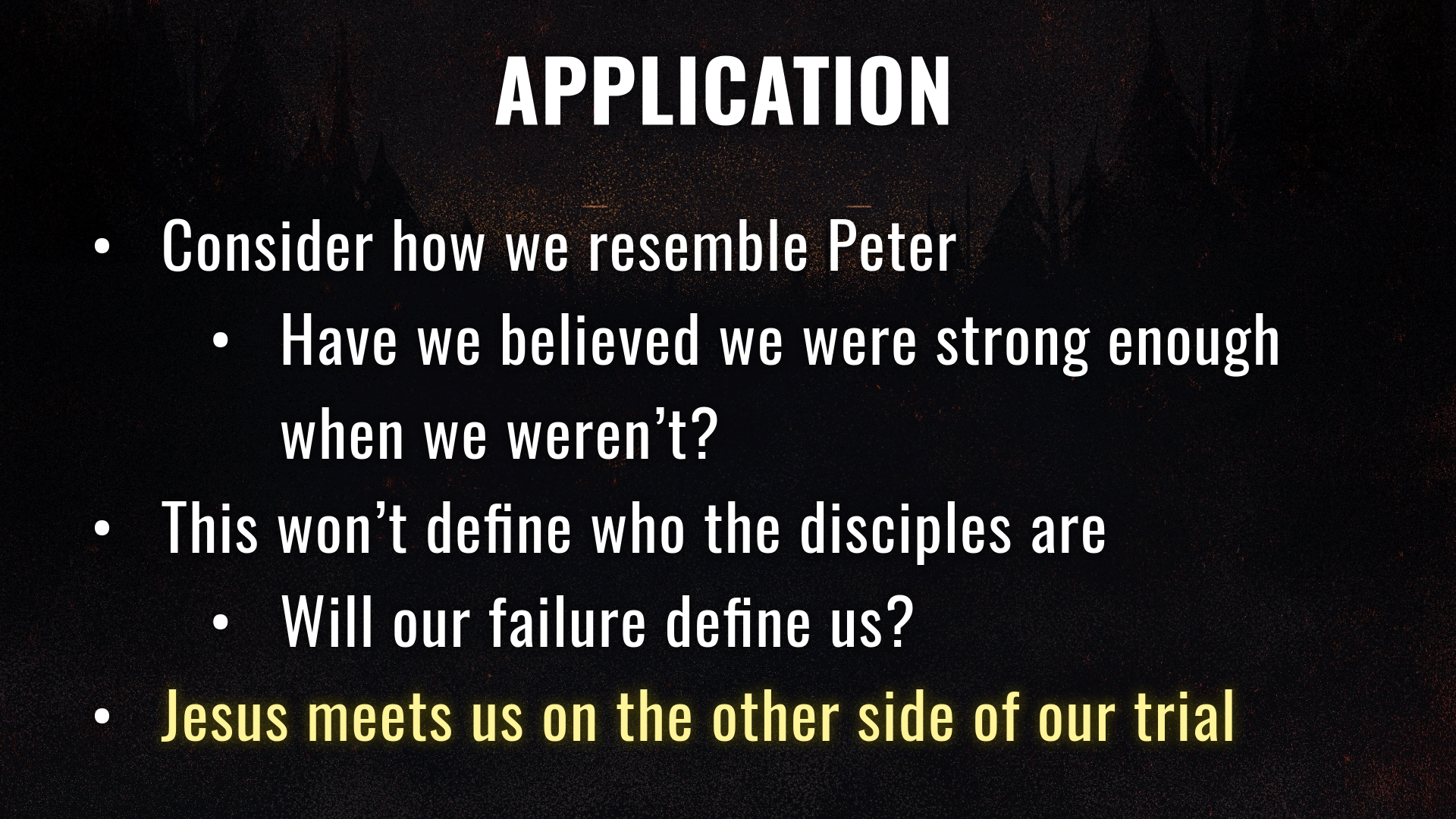Denying Christ (Matthew 26:30-35)
Do you have a weakness? Is there anything that could happen to you that would make you deny Christ? When we hear on the news about Christians being executed because they won't deny Christ, I think it's natural for us to wonder if we could do that. I want to believe that I can. But if I can't be faithful to acknowledge Christ around strangers who won't kill me, why would I be faithful in the face of death?
We have been studying through the preparation section for Jesus' crucifixion. In the last few weeks, we have seen the plot to kill Jesus. The religious leaders want him dead, and Judas has agreed to deliver him over to them. Jesus knows it's coming. He tells them we will experience the Passover in two days, and then I will be delivered over to be crucified. A woman has anointed him for burial, and he has eaten his last meal with his disciples.
Singing
Matthew 26:30 (ESV) --- 30 And when they had sung a hymn, they went out to the Mount of Olives.
The Greek here said when they had hymned. It doesn't tell us what they were singing. They would have sung the praise Psalms 113-118. These Psalms are songs of praise and adoration to God, who redeemed his people out of Egypt. They also admonish the people to trust in the Lord and be faithful. It's a very fitting way to end a meal on Passover day. These hymns would remind God's people that God is faithful and steadfast in his love for them. They might have also sung Psalm 136, which repeats that phrase over and over again.
Bad News
Matthew 26:31--35 (ESV) --- 31 Then Jesus said to them, “You will all fall away because of me this night. For it is written, ‘I will strike the shepherd, and the sheep of the flock will be scattered.’ 32 But after I am raised up, I will go before you to Galilee.” 33 Peter answered him, “Though they all fall away because of you, I will never fall away.” 34 Jesus said to him, “Truly, I tell you, this very night, before the rooster crows, you will deny me three times.” 35 Peter said to him, “Even if I must die with you, I will not deny you!” And all the disciples said the same.
In this verse, Jesus tells his disciples more shocking news. He has already told them that he will die and be crucified. He has also told them that one of them will betray him. Now he tells them that they will all abandon him. These eleven men have all been with Jesus for years. They have left everything to follow him when no one else would. They have shown their faith and cast out demons. They have resisted the temptations of the religious leaders to deny Jesus all along the way. But Jesus knows what is next. He knows it will be too much for them.
It Is Written
He also says, "For it is written." We have seen this fulfillment idea throughout Matthew. This falling away is foretold in the Old Testament. God knew that this would happen from the very beginning. But he quotes an exciting text, Zechariah 13.
Zechariah is one of the last prophets of Israel. He foretold the coming Messiah on many occasions, but the text in Zechariah 13 didn't seem to fit.
Zechariah 13:3--6 (ESV) --- 3 And if anyone again prophesies, his father and mother who bore him will say to him, ‘You shall not live, for you speak lies in the name of the Lord.’ And his father and mother who bore him shall pierce him through when he prophesies. 4 “On that day every prophet will be ashamed of his vision when he prophesies. He will not put on a hairy cloak in order to deceive, 5 but he will say, ‘I am no prophet, I am a worker of the soil, for a man sold me in my youth.’ 6 And if one asks him, ‘What are these wounds on your back?’ he will say, ‘The wounds I received in the house of my friends.’
To set up the text where this is quoted, we see that prophets will be scared to reveal their message. They will be betrayed by their family and deny their calling because it will hurt to be a prophet.
Zechariah 13:7--9 (ESV) --- 7 “Awake, O sword, against my shepherd, against the man who stands next to me,” declares the Lord of hosts. “Strike the shepherd, and the sheep will be scattered; I will turn my hand against the little ones. 8 In the whole land, declares the Lord, two thirds shall be cut off and perish, and one third shall be left alive. 9 And I will put this third into the fire, and refine them as one refines silver, and test them as gold is tested. They will call upon my name, and I will answer them. I will say, ‘They are my people’; and they will say, ‘The Lord is my God.’ ”
The difficulty of this text is that it seems to be God sending the sword against his shepherd. In the past, that meant that the shepherd was evil. Plus, it tells us that the sheep will be scattered and that God will be against them. That doesn't sound like something God would do to his sheep. But, by the end, we see that God is working to refine evil people. He wants them to be what he promised they would be, and it's only through the fire that they can become obedient.
Jesus helps us understand this prophecy. He is the shepherd who "stands next to God." He will be struck, and his disciples are the sheep who will scatter.
Jesus Knows
Can we take a second to appreciate the fact that Jesus knows his disciples will be abandoning him? He does not trust them to stand by him until the end. He knows they won't do that, but he still loves them and wants to help them. Throughout all of this section, Jesus shows us that he knows every event before it happens. He didn't get caught off guard. He came to earth for this purpose, and he knew men would seek to kill him, betray him, and abandon him. But he came anyway. His love wasn't dependent on the faithfulness of men. He didn't decide that he would go through with it if he could find one man who would stand with him. He was going to go through with it even though no one would be righteous enough to stand with him.
"No I Won't"
The disciples respond to Jesus' prediction differently than the prediction of betrayal. They had a sense of humility in that text, but now that is all gone. Now, they believe that they will be faithful to the end. So they reject Jesus' prediction. The truth is that they aren't willing to submit to Jesus completely. They don't want to believe that Jesus will die. That one doubt has made it difficult for them to trust whatever Jesus says entirely. What's interesting is that John's gospel tells us a final sermon Jesus has given his disciples (Chapters 13-17) where he details his plan to go to the Father and send them the Holy Spirit to help them. But they don't care. They have determined in themselves to stay with Jesus no matter what.
Peter starts the contradiction. His words are bold and foolish. I think the words of Jesus are challenging his faithfulness. Peter believes that he is strong enough to choose Jesus in the face of death, but he has no idea what Jesus is about to do. Peter also throws everyone else under the bus. He says, "Though they all forsake you, I will not." He thinks this is his opportunity to be the greatest in the kingdom. But has he learned nothing? In the kingdom, the first will be last and the last, first. The rest of the disciples join in. Everyone wants to be the greatest, but they prove that they are all foolish.
Did you notice that Peter doesn't reject what Jesus says just once? He does it twice. Peter has a long history of rejecting what he doesn't want to hear. Peter may be one of the most stubborn and hard-hearted of all the disciples. In Matthew 16:18, we saw Peter tell Jesus that he would not suffer and die on a cross. Jesus told him, "Get behind me, Satan." John's gospel tells of another instance where Jesus was going to wash the disciples' feet, but Peter refused at first. Peter is not afraid to speak his mind, and he is willing to reject what Jesus says if he disagrees. But Peter has no idea what he is talking about. He would do better to keep his mouth shut and learn from his mistakes. Jesus knows everything that will take place.
Jesus tells Peter that before the rooster crows, Peter will deny him three times. This added detail lets us know that Peter will deny Jesus three times in less than 8 hours. He absolutely knows everything.
Don't Deny Christ
As we study this, one text that comes to my mind is Jesus' words back in Chapter 10.
Matthew 10:32--33 (ESV) --- 32 So everyone who acknowledges me before men, I also will acknowledge before my Father who is in heaven, 33 but whoever denies me before men, I also will deny before my Father who is in heaven.
These disciples know that they better not deny Christ. Jesus has told them that if they deny him, he will deny them. What is going to happen?
What Do We Learn?
Eventually, we will make it to where the disciples abandon Jesus, as he predicted. Peter will deny Jesus three times. But as we study this text, we learn some critical lessons.
First, we learn that Jesus knows our weaknesses. What a wonderful and terrifying thought. He knows all that we will do before we do it because he is God. These last few texts have shown us how Jesus knew everything that was set to place before it happened. Some might say, "Why wouldn't Jesus change things? Why wouldn't he stop Judas? Why wouldn't he destroy the murderous leaders? Why wouldn't he save his disciples from denying him?" We might have stopped these things, but that was not a part of God's plan. We will study this more and answer those questions next week. For now, we see that Jesus knew everything that was going to happen to him and his disciples, but he still went through it all. The short answer to "Why would he do that?" is that he did this for those weak disciples and all who would follow them. It is good for the disciples to fail.
Jesus doesn't hate those who are weak. He doesn't want to deny those who deny him. He's not looking for that one event where they slip up so he can cut them off. He loves them with an everlasting love. His steadfast love endures forever. Even though they are all going to abandon him, he will return and forgive. Listen to these words from verse 32 again.
Matthew 26:32 (ESV) --- 32 But after I am raised up, I will go before you to Galilee.”
Do you see that Jesus is already preparing them for the next step? Jesus always has a future available for his weak followers. He has a plan to do good for them and to help them. He doesn't want to reject them. He doesn't want them to reject him, but he won't hate them for it. We see in this text that Jesus completely understands and sympathizes with his disciples. What tremendous love.
Application
Denying Jesus is not going to define who the disciples are! They will bounce back and acknowledge his name before men until they die. Now, let's take a moment to think about what this text means to us. Do we let our failure define us?
Do we feel the resemblance to Peter? When I was younger, I thought I would save the world. I told everyone their sins in hopes that they would turn from their sins and believe. I was bold, but I remember having a conversation with my dad. He heard about my zeal and told me not to talk about religion and politics at work. I love my dad, but he was wrong. Still, his words affected me.
Later on in life, I was at a job interview with a hydraulic company. The hiring team was not very spiritually-minded. It's one of those things you could sense by talking about money and life in general. It was nearing the end of the interview, and this place sounded like a great place to gain experience. I was excited to hear that they were interested in hiring me. But they hit me with a question I wasn't expecting. They asked me, "Who is your idol?" My mind went blank. I didn't feel comfortable saying Jesus. Of all the people I could have mentioned (my mom, dad, grandfather, people from church, etc.), I chose Tiger Woods. This was before he got caught cheating on his wife and wrecking his SUV. That happened less than a year later.
I replay that conversation and the conversation I had with my dad in my mind. Since then, I think about the number of times that I have been too much of a coward to mention Jesus. Then, I look at how Jesus knew the disciples would be weak, and I know that Jesus hasn't given up on me. If you have done the same type of thing, know that Jesus hasn't given up on you either. But he wants us to learn from our mistakes and be refined by the trial. Jesus will meet us on the other side of the trial and give him what he needs to be strengthened so we can glorify him the next time.
The key is to stop thinking, "I will never fall." On our own, we will fall time and time again. We need the strength of the Lord. We need to trust in the power of his might to fight the spiritual battle that is ahead of us. The spiritual forces of evil are too much for us, but not too much for Christ who stands with us. We must remind ourselves to look to God and forget about trusting in ourselves. By my strength, I can't. By Jesus working through me, I can. I can talk to strangers about Jesus. I can stand up for what I know is right without fear of consequences. I can speak when people want me to stay quiet. I can share the good news so that more souls will be saved and Satan will be defeated.
Conclusion
Jesus knew when he came to earth how weak and sinful man was, but he still chose to go to the cross. He knew his disciples were weak, but he still chose them and worked with them for three years. After three years with Jesus, they didn't learn enough to remain faithful to him in a dangerous situation. But their failure and Jesus' forgiveness will train them to be faithful in the future. What about us? Has our failure to acknowledge Jesus and speak about him in what we perceive to be a dangerous situation resulted in training and greater boldness?






